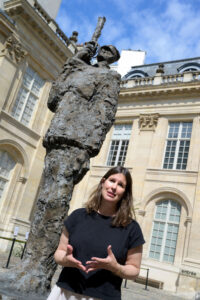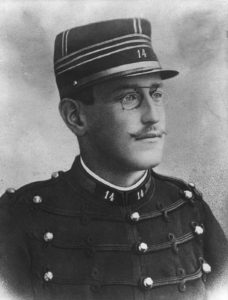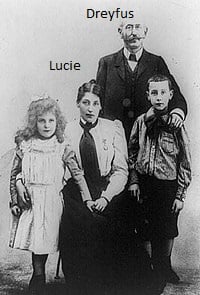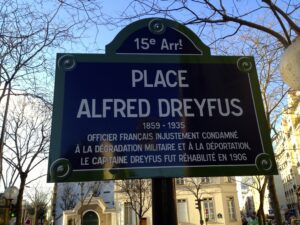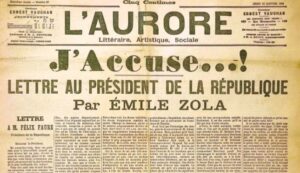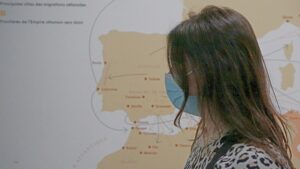In the footsteps of the Alfred Dreyfus Affair
Intellectuals! We all know what Intellectuals means… but did you know that this word was tightly linked with the famous Dreyfus-affair?
The term intellectuals was used for the first time ever in the late 1800-s to designate the writers, scientists, politicians, journalists who supported Dreyfus by believing he was not guilty.
Let’s find out what happened exactly, who Dreyfus was and what effect “the Affair “had on France, then and today.
Alfred Dreyfus’ life in a nutshell
Alfred Dreyfus was born in 1859 in the city of Mulhouse, in a region east of France, called the Alsace.
His father, like many traditional Jews of Alsace, had a textile company.
In 1870 a war began between France and Prussia ( Germany today ). The French lost the war and also lost the region the Alsace to the Germans.
Dreyfus’ family, like many other Jewish French families there, did not want to become German and moved to Paris.
After high school, Alfred Dreyfus joined the army.
He was accepted into the prestigious military officers school founded by Napoleon Bonaparte, “L’Ecole Polytechnique” and the school of artillery.
Shortly after he started his military career, he joined the artillery where he was ranked Captain in 1889, the year the Eiffel Tower was inaugurated.
A few years later he joined the Army Headquarters, where in theory he had access to secret documents.
When he was 31, he married the 20 year old Lucie and they had two children, a boy and a girl.
The Dreyfus Affair started in 1894 and sent Dreyfus as a prisoner to Devils island for several years. When he was finally released in 1899, he recuperated in the south of France.
In 1906 he was officially rehabilitated and joined the French army again.
During WW 1, he fought in the French artillery.
He died in 1935, at the age of 75 and was buried in Paris at the Montparnasse cemetery.
During WW II, his wife, being Jewish, had to hide in the South of France and died shortly after the end of the war.
The Dreyfus affair
In 1894, the cleaning women of the German Embassy in Paris, emptied a garbage can in the offices and discovered a torn letter.
As she was a spy for the French Counter Intelligence, she brought the letter to her superiors who glued the pieces of letter together.
It turned out to be a handwritten, anonymous letter of a French officer in which he promised he would transfer French confidential military documents to a foreign nation.
Dreyfus, being Jewish, was the perfect criminal.
Antisemitism cycles in France
It is known that Antisemistism happens in cycles in France.
Dreyfus was unlucky, as, since the end of the Franco-Prussian war and the loss of the region the Alsace, there was a general antisemitic idea growing in France: “The Jews were responsible for this disaster”
Nationalism was rising with an anti-semitism feeling, they went hand in hand.
Dreyfus was arrested, questioned and accused of espionage.
He denied everything.
He was left alone in a room with a charged pistol so he could kill himself and avoid public shame, but he didn’t shoot himself.
The handwriting of Dreyfus was not similar to the handwriting in the letter.
The French army didn’t want to admit they caught the wrong man. They said Dreyfus wrote differently, or used a different hand or style of writing, on purpose.
He remained in prison, and an anti-semitic newspaper started to write about the case, accusing Dreyfus and blowing the case to the public, making it mediatized and famous.
When his case came to court, he and his lawyers were sure he would be found not guilty, as there was absolutely no proof against Dreyfus.
But the prosecution sided with the French Ministry of War. New “secret” proof against Dreyfus was produced during the trial.
The proof is so “secret” that the Army could not reveal what it was.
Later it turned out that the secret proof was absolutely not real.
Poor Alfred Dreyfus was found guilty of treason, without proof and was exiled to Devil’s Island, in front of the coast of Guiana, a terribly isolated island used as a French penal colony.
Before being exiled he was publicly degraded, in the presence of 4000 soldiers and 20.000 civilian spectators. The crowds shouted antisemitic insults but even after this humiliating act, Dreyfus remained worthy, as he did during the many years to follow.
Alfred Dreyfus, still faithful to France, raised his arms and shouted: “Soldiers, an innocent man is degraded ! Soldiers, an innocent man is dishonored! Long life to France! Long life to the French army !”
On Devil’s Island, Alfred was all alone with his guards, and suffered from malnutrition, the heat, tropical diseases and of course loneliness.
In France, his brother and wife continued to fight for his freedom and rehabilitation back in France.
They were joined by a journalist, Bernard Lazare. They requested a new trial, but in response the army just produced more fake evidence.
Finally, Georges Picquart, a military investigator discovered the real traitor, a French officer who was in need of money. The real traitor is Ferdinand Walsin Esterhazy.
In response, the army sent the Honest lieutenant Colonel Picquart to North Africa and later he was even jailed for “forgery” because he sided with Dreyfus.
But the supporters of Alfred Dreyfus did not leave it there and soon they were joined by many intellectuals and famous people to name a few: Clemenceau (Journalist-Statesman), Anatole France (Poet) and Emile Zola (Journalist-Writer) …
Emile Zola, a famous French journalist, decided to challenge the government.
He wrote an article that was published in January 1898, in which he accused the French President of persecuting Dreyfus falsely.
He hoped the article called “J’accuse”, (See recent movie “j’accuse”) , would get him prosecuted for defamation, so that he could expose the unfair trial of Dreyfus in front of a judge.
This did happen, and Dreyfus, who until then had no idea of what was going on, was brought back from his exile to join the trial back in France.
Emile Zola was found guilty of defamation, but the French Army understood they had to let Dreyfus go free, under pressure.
In September 1899, he left prison and in 1906 he was finally rehabilitated.
His intellectual supporters wanted him to continue to fight and to sue the French Army, in court, but Alfred Dreyfus was too weak to continue this fight.
All he wanted was to work and live quietly.
He accepted the Presidential and military grace.
The repercussions of the Dreyfus Affair.
French history is rich and the French people were often divided.
But the Dreyfus affair is still today considered as the beginning of a clear split between the left and right, or between the “intellectuals” and “the populists“.
As the Dreyfus affair dragged along, the French society split into two: the pro “Dreyfusards” and “anti Dreyfusards.”
Basically, like any trial by public, each French citizen has an opinion about whether Dreyfus was guilty or not.
It divided French society, but also gave birth to the very first league of civil rights called the “Human Rights League of France” :
Birth of Israel
The Dreyfus affair also launched and encouraged the Zionist movement and indirectly led to the precipitation of the birth of the Jewish state of Israel.
A certain Theodor Herzl, a journalist who covered the trial against Alfred Dreyfus for an Austrian newspaper and witnessed the humiliating degradation, was so shocked by the antisemitic atmosphere in France, that he decided that the only way for the Jews to be considered equal, was for them to have their own state.
And from then on this became his purpose in life.
During WW II, the same schism in French society remained: you had the French collaborating government on one side, and a huge number of French men and women who saved Jews by risking their own lives, the Righteous among the Nations such as Marcel Marceau.
Antisemitism in France
Today, antisemitism still exists in France, like in all western democratic countries… But not more or less than anywhere else.
There are people that use Israeli politics to justify their antisemitism, but generally Jews of France can live their life as they want and today antisemitism is punished by law in France.
These new laws were also indirectly inspired and influenced because of the Dreyfus affair and “the intellectuals”.
Anti-semitism acts are surveiled by The Shoah Foundation, the government and the European Union, producing annual reports with accurate Data.
The institute of the Arabic World in Paris is offering a great exhibit that covers the History of Jews in the Arabic World. It was also a good opportunity to raise awarness of the antisemitism in the Arab world.
A Dreyfus tour in Paris
There are many sites that remind us of the Dreyfus affair.
The Pantheon, the Ecole Militaire, where the degradation of Dreyfus took place, and many other many Parisian sites related to Dreyfus in a walking tour with few small trips by cab.
During WW I, Dreyfus wife, Lucie and their daughter Jeanne, both volunteered as a nurse for the French Red Cross, and worked in the Parisian hospital Saint Louis.
To visit the centuries old courtyard of this hospital is a treat.
A moving statue of Dreyfus, sculpted by Tim – Louis Mitelberg, can be seen in Paris. The statue has been on the move since it was first exposed, showing how the Dreyfus affair is still a sore memory.
https://jewish-paris-tours.com/2020/08/jewish-paris-the-wandering-statue-of-captain-dreyfus/
The Jewish art museum in Paris has a section about the Dreyfus affair.
We will pass by the Presidential palace, the Elysee. The president who gave the green light to the French army to prosecute Dreyfus despite any proof was Felix Faure. We have some juicy stories about him for you….
And we can visit his grave and pay a tribute to Alfred Dreyfus and his courageous family.
Engraved on his tombstone we will notice the name of Alfreds’ granddaughter, Madeleine Levy.
She joined the French resistance during WW II.
She was arrested and murdered in Auschwitch.
In Médan, a lovely town by the river Seine, one hour drive west of Paris, we can visit the country house of Emile Zola.
A special exhibit was recently opened about the Dreyfus affair.
https://www.timesofisrael.com/france-opens-worlds-first-museum-dedicated-to-dreyfus-affair/
And before coming to Paris you could watch the excellent movie « An officer and a spy, by Roman Polanski.
Check out my new jewish tours in Paris : https://jewish-paris-tours.com/exclusive-jewish-tours-paris/
Please feel free to send me your thoughts or your plans to visit Paris with me.
Best regards,
Flora Goldenberg from Jewish Paris Tours
Biography of a Tour Guide in Paris
